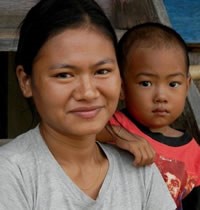Kikim in Indonesia

Photo Source:
Copyrighted © 2026
International Mission Board-SBC - Jacob Talley All rights reserved. Used with permission |
Send Joshua Project a map of this people group.
|
| People Name: | Kikim |
| Country: | Indonesia |
| 10/40 Window: | Yes |
| Population: | 96,000 |
| World Population: | 96,000 |
| Primary Language: | Malay, Central |
| Primary Religion: | Islam |
| Christian Adherents: | 0.00 % |
| Evangelicals: | 0.00 % |
| Scripture: | New Testament |
| Ministry Resources: | Yes |
| Jesus Film: | Yes |
| Audio Recordings: | Yes |
| People Cluster: | Pasemah of Sumatra |
| Affinity Bloc: | Malay Peoples |
| Progress Level: |
|
Introduction / History
The Kikim people group live in the Eastern Kikim, Central Kikim, Western Kikim, Tebing Tinggi and Lahat districts in the Lahat regency in South Sumatra province. The Kikim are generally the only people group in the Eastern, Central and Western Kikim districts but there are a few areas with a small number of Javanese as well. In Tebing Tinggi, the Kikim live alongside the Lintang people, Javanese, Sundanese and Saling (Lembak) people. In Lahat, the Kikim live alongside the Lematan people, Javanese and Sundanese. The Kikim can easily understand the Lintang Empat Lawang, Besemah and Semendo dialects, but do not understand the Saling or Lembak dialects. One characteristic of the Kikim dialect is the word 'lede', which means "no." The Kikim are also able to understand the Lematang, Ogan, Enim, Palembang and Belide dialects, among others. However, the Kikim are not able to understand the Komering, Ranau, Daya, Kayu Agung and Aji dialects.
What Are Their Lives Like?
In western Kikim and Tebing Tinggi area, most of the Kikim are rice farmers. The type of rice planted only takes 6-7 months until it is ready for harvest. They can grow rice twice a year because their water needs are supplied from the small rivers nearby. In the eastern Kikim area, rubber is the Kikim's main cash crop whereas rice is an additional crop grown between the rubber trees. Then when the rubber trees become mature, rice can no longer be grown in that field. Rice that is grown is important for basic dietary needs, while sales from the rubber plant products provide income for other food and living costs. Many people in the Kikim community have chosen to plant rubber trees because the income can be used to pay for daily living costs. On average, they each have one hectare of land. One interesting characteristic of the Kikim and Lematang people is that they are not very hard working when living in their hometowns, but become more diligent when they work in other places. For instance, they are willing to sell cassava leaves, fruits and other small trade goods. They will concentrate their efforts on earning money. This is something they do not do in their hometown.
What Are Their Beliefs?
The Kikim are known to be followers of Islam. Muslims believe that they will be judged based on their knowledge of the Qur'an (their holy book) and on their deeds. Besides these beliefs, remnants of their old animistic beliefs are still seen in the Kikim's lives. The Kikim are known for a traditional ceremony called Sedekah Rame, where the whole village eats a ceremonial meal together while sitting in a place called the Tanah Badahe Setue (Future Burial Ground) in the middle of the rice fields. That place is set aside as a place for burning incense, presenting ritual offerings to spirits and lighting bonfires.
What Are Their Needs?
The Kikim need a better system for field irrigation. At present, their farming very much depends on rain even though there are small rivers coming from the Bukit Barisan mountains that can be utilized. Other than that, their manufacturing activities are still at the level of small scale home production that needs to be improved and expanded to supplement their income. Their pattern of moving often makes it difficult for these farmers to be formally educated. Those that have access to education must deal with an under-funded educational system with inadequate infrastructure. Many school buildings are in poor repair and there are not enough teachers. Many children do not go to school or have dropped out. Many Kikim children also suffer from malnutrition.
Prayer Points
Pray for his kingdom to come and his will to be done among the Kikim people.
Pray for a movement of Kikim households to study the Bible and accept the blessings of Christ.
Pray for a spiritual hunger that will drive the Kikim people to the arms of Jesus.
Pray for workers who are filled with the fruit and the power of the Holy Spirit to go to the Kikim people.